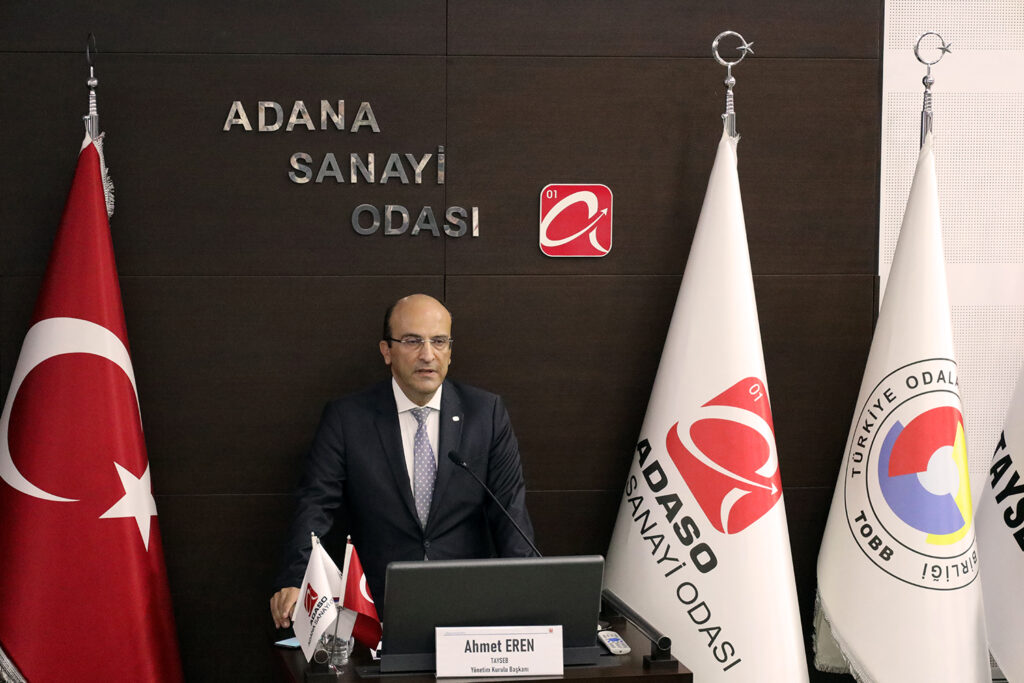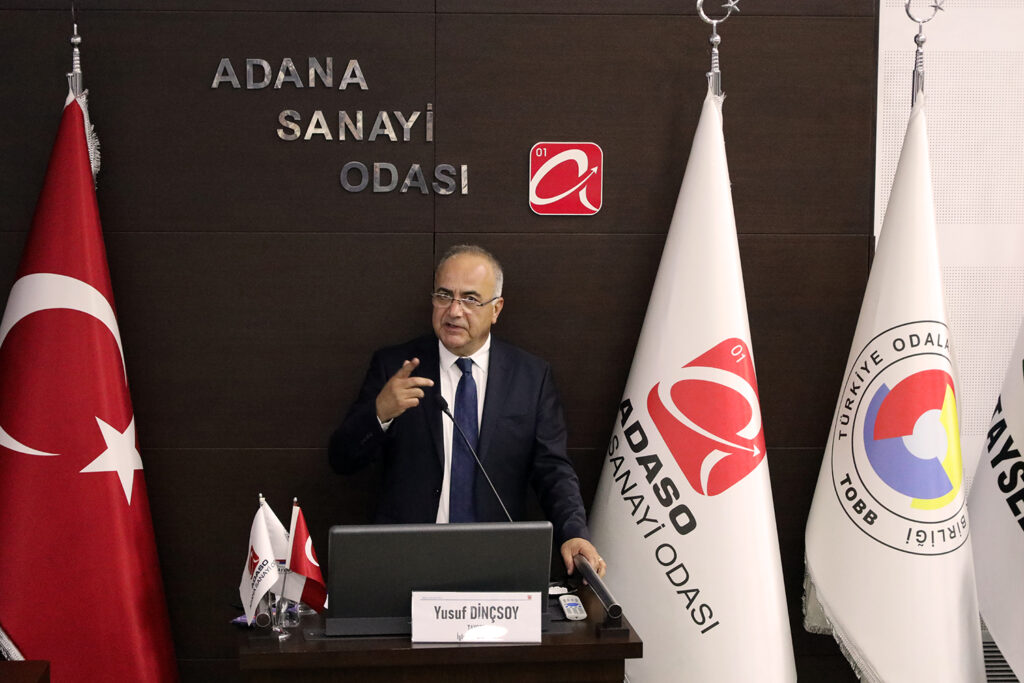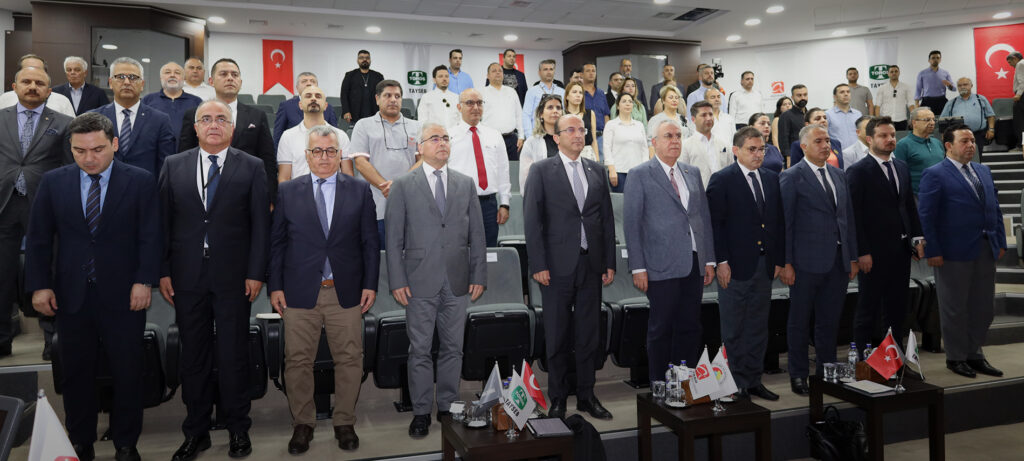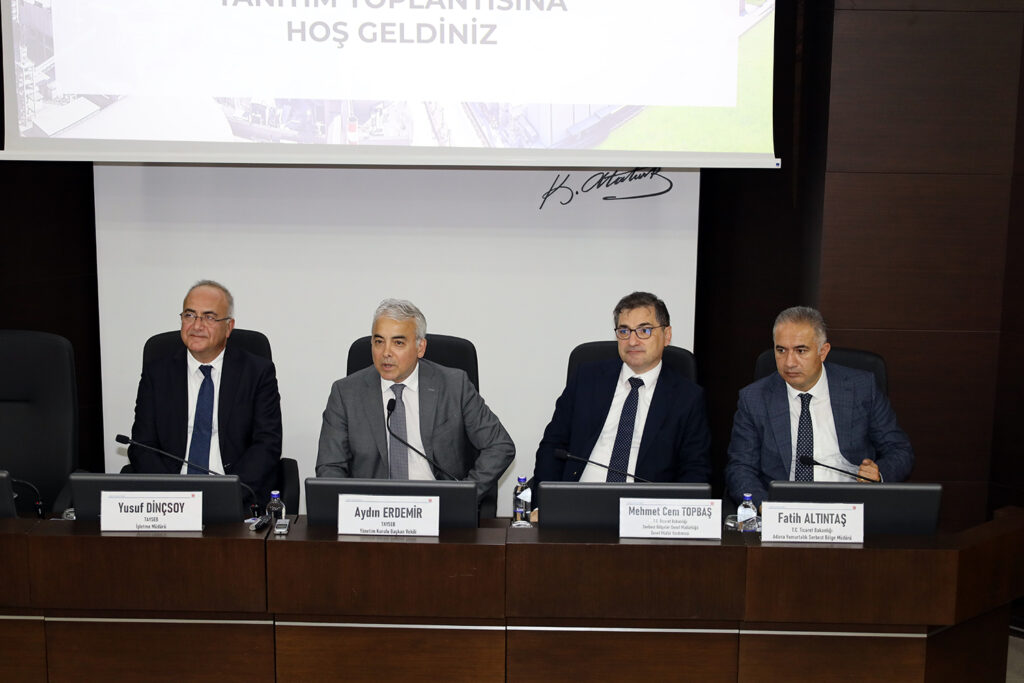Toros Adana Yumurtalık Free Zone Founder and Operator Co., Inc. (TAYSEB) hosted a specialized meeting in Adana to elucidate the investment incentives and opportunities available in the region to companies oriented towards production and export. With a steadfast commitment towards evolving into the industrial hub of the Eastern Mediterranean, TAYSEB extends support to investors through a spectrum of advantages, including tax exemptions, comprehensive infrastructure services up to individual parcels, logistical benefits, and the seamless access facilitated by Torosport Ceyhan Port. Toros Adana Yumurtalık Free Zone Founder and Operator Co., Inc. (TAYSEB), renowned as one of Turkey’s largest free zones spanning 3.6 million square meters, is steadfast in its ambition to evolve into the industrial hub of the Eastern Mediterranean. Positioned strategically at the heart of key investment regions, TAYSEB highlighted its strategic positioning in vital investment zones, logistical benefits, provision of complementary infrastructure services, and tax exemptions in a special meeting. The session aimed to elucidate investment incentives and opportunities, particularly targeting investors involved in export-oriented production. The meeting was attended by prominent figures including Ahmet Eren, Vice President of Tekfen Holding Agricultural Industry Group and Chairman of the Board of Directors at TAYSEB, Aydın Erdemir, Deputy Chairman of the Board of Directors at TAYSEB, and Yusuf Dinçsoy, Business Manager at TAYSEB, alongside Mehmet Cem Topbaş, Deputy General Manager of the General Directorate of Free Zones at the Ministry of Trade, and Zeki Kıvanç, Chairman of the Board of Directors at Adana Chamber of Industry. Ahmet Eren: Third phase endeavors have commenced Ahmet Eren, Vice President of Tekfen Holding Agricultural Industry Group and Chairman of the Board of Directors at TAYSEB, underscored Tekfen’s multifaceted portfolio spanning construction to agriculture, leveraging 68 years of expertise across 41 companies and a workforce of 12 thousand. Eren emphasized Çukurova’s significance to Tekfen, stating, “Çukurova holds a significant position for Tekfen. It’s where we achieved milestones like completing the Tarsus-Adana-Gaziantep highway, marking the first major highway project by Tekfen Construction. Furthermore, we established Toros Agri’s inaugural fertilizer factory in Ceyhan. Additionally, Ceyhan stands as a cornerstone in our port operations under Toros Agri’s purview”. Noting TAYSEB’s longstanding presence since its establishment in 1990, Eren emphasized, “With our port facilities situated in Ceyhan, alongside the services we provide, we extend increasing support to TAYSEB annually, particularly in the handling of liquid chemicals and vegetable oils. Businesses within TAYSEB utilize our Ceyhan port services. In recent years, the majority of stakeholders in our region have directed investments towards various sectors, notably energy. As a founder and operator, we remain committed to ongoing infrastructure enhancements aimed at fulfilling the needs of our investors. Our commencement of third-phase initiatives underscores this commitment. The consistent growth in foreign trade volume within our free zone is a source of pride for us.” Yusuf Dinçsoy: Anticipating investors for production and export opportunities Yusuf Dinçsoy, TAYSEB’s Business Manager, underscored the appeal of Toros Adana Yumurtalık Free Zone, stating, “In the free zone, profits generated from production are entirely exempt from corporate or income tax. Exporting 85 percent or more of produced goods grants exemptions on employees’ wages from income taxes. Within these zones, all users, whether local or foreign, enjoy equal status, with products entering the region from domestic or foreign sources exempt from VAT and customs duties. While a 1 per thousand fund is levied on imported goods, no such fund applies to exported products. Furthermore, the fund rate for regionally produced goods sold domestically is set at 9 per thousand. The primary incentive within free zones lies in export opportunities. If you can source raw materials from Türkiye and sell them abroad, there is no other area that rivals the free zone.” Dinçsoy highlighted their anticipation of investors to TAYSEB, particularly those interested in production and export ventures, expressing, “In energy VAT-exempt free zones, we provide comprehensive infrastructure services, including electricity, water, natural gas, telephone, and sewage, up to the user’s parcel free of charge, assuming responsibility as the operating company. As part of our investments, we established a switchgear center and introduced natural gas infrastructure. We achieve notable cost reductions by sourcing electricity directly from the transmission system rather than the distribution system. Our investment focus remains on enhancing user competitiveness.” Discussing the logistical benefits available, Yusuf Dinçsoy outlined, “We enjoy direct access to the highway, situated 120 km from Mersin Port and 70 km from Iskenderun Port, both of which are easily reachable via highway. Adana Airport lies just 70 km away, while Erzin Train Station is a mere 18 km away. Additionally, Sönmez Cement Port, functioning as a dry cargo port within the Free Zone, extends its services to our users. Torosport Ceyhan Port, adjacent to the Free Zone, facilitates the handling of both dry cargo and liquid products. Moreover, the chemical and vegetable oil pipelines connecting Torosport Ceyhan and TAYSEB offer significant advantages. Witnessing a substantial increase in trade volume, from 103 thousand tons in 2019 to 1 million 177 thousand tons in 2023, we anticipate this figure to reach 2 million tons in the near future.” Positioned at the epicenter of an investment cluster Highlighting TAYSEB’s central location within the Iskenderun Gulf, which is poised to become a secondary industrial hub akin to the Kocaeli Gulf, Dinçsoy emphasized, “Our proximity to the Suez Canal and key markets in the Middle East, Mediterranean, and North Africa, coupled with easy access to airports, highways, and ports, positions TAYSEB at the epicenter of an emerging investment cluster. With forthcoming developments such as the Ceyhan Industrial Park, Erzin Industrial Park, Ceyhan Energy Specialized Industrial Zone, Ceyhan Industrial Park for Chemicals, Ceyhan Petrochemical Industrial Zone, and SASA Private Industrial Zone, we eagerly anticipate investors for our diverse parcels, spanning over 1 million square meters for shipyards, ports, marinas, and yacht manufacturing, as well as nearly 600 thousand square meters for other sectors.” Mehmet Cem Topbaş, Deputy General Manager of the General Directorate of Free Zones at the Ministry of Trade, outlined the primary objectives of free zones as making export-oriented production, emphasizing, “Free zones in Türkiye are strategically geared towards boosting exports, attracting direct foreign investments, fostering employment growth, facilitating advanced technology transfers, and bolstering regional development. As part of our medium-term plan spanning 2024 to 2026, our foremost priorities include attracting high-tech foreign investments, promoting the use of renewable energy, and implementing regulatory measures to enhance the role of free zones in promoting a green and circular economy.” Zeki Kıvanç, Chairman of the Board of Directors at the Adana Chamber of Industry, emphasized, “The significance of the Ceyhan and Yumurtalık regions is steadily escalating. These areas host a plethora of vital investments, including the Industrial Park for Chemicals, Ceyhan Petrochemical Industrial Zone, Ceyhan Industrial Park, and SASA Private Industrial Zone. Moreover, plans are underway for the construction of a new container port in our vicinity. As these investments come to fruition, Adana is poised to emerge as a pivotal economic hub in the Turkish century”. Following the speeches, participants’ questions regarding the free zone were answered in the panel moderated by Aydın Erdemir, Deputy Chairman of the Board of Directors at TAYSEB.




